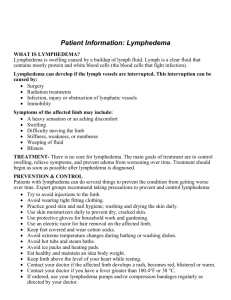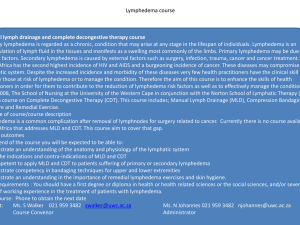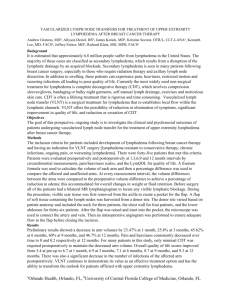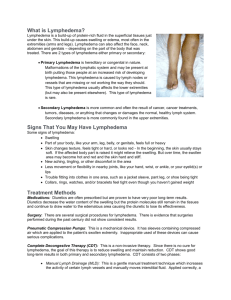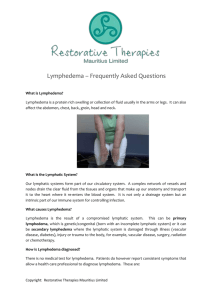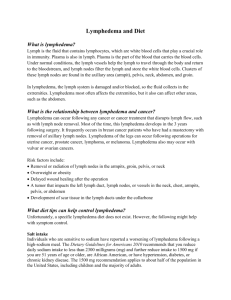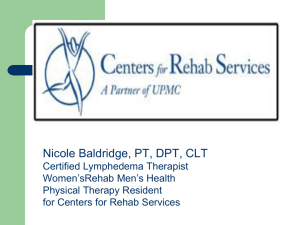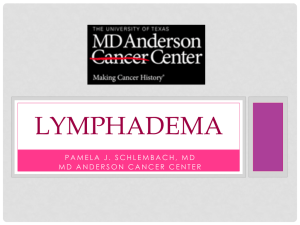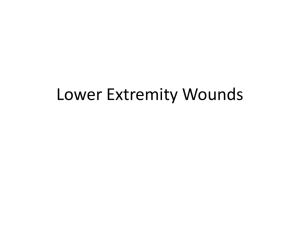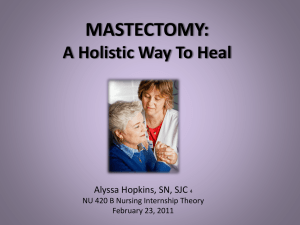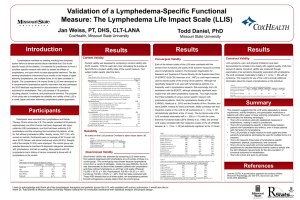MODERN REHABILITATION PROGRAMS IN
advertisement
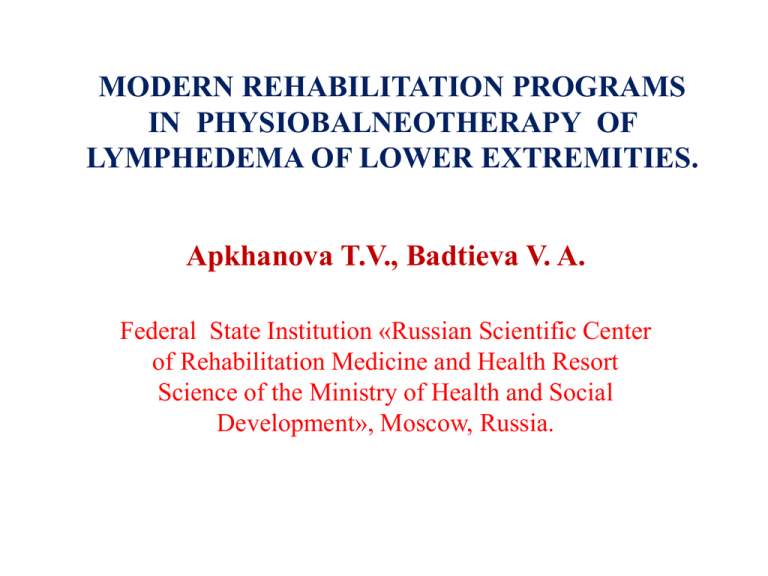
MODERN REHABILITATION PROGRAMS IN PHYSIOBALNEOTHERAPY OF LYMPHEDEMA OF LOWER EXTREMITIES. Apkhanova T.V., Badtieva V. A. Federal State Institution «Russian Scientific Center of Rehabilitation Medicine and Health Resort Science of the Ministry of Health and Social Development», Moscow, Russia. *In the general structure of a vascular pathology lymphedema of lower extremities occupies about 8-10 %. *lymphedema suffer about 120 million persons in the World.(World Health Organization,2002). *In Moscow every tenth patient addressing for the specialised help to phlebologist, suffers a lymphatic odema of extremity. The problems for patients with Lymphedema: -A FEELING OF HEAVINESS -COSMETIC DEFORMITY -SLIGHT DISCOMFORT -REPEATED EPISODES OF INFECTION (CELLULITIS AND LYMPHANGITIS) - MALIGNANT DEGENERATION (STEWART-TREVES SYNDROME) -THICKENING OF THE SKIN -HARDENING OF THE LIMB -LEAKAGE OF LYMPH -MASSIVE SWELLING (ELEPHANTIASIS) *THESE CONDITIONS CONSIDERABLY DECREASE THE QUALITY OF A LIFE. Etiological classification of Lymphedema Primary lymphedema: • hypoplasia lymphatics and lymph nodes • hyperplasia lymphatics • aplasia lymphatics and lymph nodes • • • • • • • • Secondary lymphedema: damage or removal of regional lymph nodes through surgery Radiation of regional lymph nodes infection after traumas or tumor invasion or compression. vein stripping, peripheral vascular surgery (arterial reconstruction) liposaction burns, burn scar excision insect bites Treatment of Lymphedema of lower extremities Conservative therapy: • recommendations about change of a way of life • skin care • medicamentous treatment (benzopyrones, antibiotics, and antifungal antibiotics) • compression by a lowstretch elastic stocking • Сomplex physiotherapy • pneumocompression Operative treatment: • Microsurgery • Surgical resection • Liposuction *PHYSIOTHERAPEUTIC TREATMENT OF LYMPHEDEMA OF LOWER EXTREMITIES TAKES LEADING POSITIONS IN LYMPHEDEMA TREATMENT (2009 Consensus Document of the International Society of Lymphology). CLINICAL CLASSIFICATION OF LYMPHEDEMA (SAVCHENKO T.V., POKROVSKY A.V., 2004) I stages –latent or subclinical edema II stage - permanent (constant) edema III stage - increase edema with subdermal fibrosis IV stage - elephantiasis Actions of various physical factors • stimulation of a lymphatic drainage (strengthening methods to stimulate lymph flow dynamics and lymphangion activity) • acceleration lymph transport • stimulation extralymphatic factors of lymph circulation (a muscular pump of a shin) • restriction lymph formation • normalisation of processes of microvascular circulation The primary goals of Complex Decongestive Physiotherapy (CDT): 1. decrease edema 2. increase lymph drainage from the congested areas 3. reduce subdermal fibrosis 4. improve the skin condition 5. enhance patient’s functional status In Center clinic we have developed and use rehabilitation programs with the following methods: • • • • • • • magnetic stimulation, magnetic laser therapy, pulse matrix laser therapy, cryotherapy, pneumocompression, balneotherapy (mineral baths and black mud), thalassotherapy (algotherapy with cold seaweed application). Complex Decongestive Therapy (on method Foeldi M.) • at 1 stage - a skin care, Manual Lymph Drainage (MLD) and bandaging of the limb by bandage of a short stretching, daily, physical exercises. • At 2 stage - (MLD) 2-3 times a week are carried out, elastic support garment with the high compression ( 4 classes of the compression), made on individual measures of the patient to order («MEDI», Germany). Patient with Lymphedema III stage (Savchenko T.V., Pokrovsky A.V.'s classification, 2004) At the I stage of Lymphedema • recommendations about change of a way of life • the elastic compression • courses of medicamentous therapy once a year (mainly in summer) • preventive and medical rehabilitation programs (magnetic stimulation, a pneumocompression, magnetic laser therapy, pulse matrix laser therapy, balneotherapy, thalassotherapy), At the II stage of Lymphedema • recommendations about change of a way of life, • compression therapy, • courses of medicamentous treatment are spent 2 times a year. • medical rehabilitation programs (a pneumocompression, magnetic laser therapy, pulse matrix laser therapy, magnetic stimulation, cryotherapy, balneotherapy, thalassotherapy, Manual Lymph Drainage and bandaging of the limb) are spent 2 times a year. At the III stage of Lymphedema • to change of a way of life, • compression therapy, • Medical rehabilitation programs (a pneumocompression, magnetic laser therapy, magnetic stimulation, pulse laser therapy, cryotherapy, balneotherapy, thalassotherapy, Manual Lymph Drainage and bandaging of the limb) are spent 2-3 times a year. • Medicamentous treatment is spent by courses for 4-6 months and includes preventive appointment of the prolonged antibiotics for prevention of relapses of an erysipelatous inflammation. At the IV stage of Lymphedema • patients accept surgical treatment with carrying out of conservative preoperative preparation and postoperative rehabilitation with use specified physiotherapeutic and medicamentous means. Patiens with IV stage of Lymphedema Patient with secondary Lymphedema II stage (Savchenko T.V., Pokrovsky A.V.'s classification, 2004) For treatment After treatment DEVELOPMENT PHYSIBALNEOTHERAPY OF LYMPHEDEMA IN RUSSIA Absence profile the special Lymphological centres in Russia is compensated by an existing wide network of branches of regenerative medicine and Health Resort establishments. At stages of regenerative and Health Resort treatment patients with Lymphedema can spend effective complex not medicamentous therapy with application of a wide spectrum physiobalneotherapeutic methods. Conclusion • Creation of modern rehabilitation programs of regenerative treatment of patients with Lymphedema has allowed to raise considerably efficiency of conservative Lymphedema treatment and to create necessary base for development in Russia a physiotherapeutic direction in treatment Lymphedema of lower extremities.
